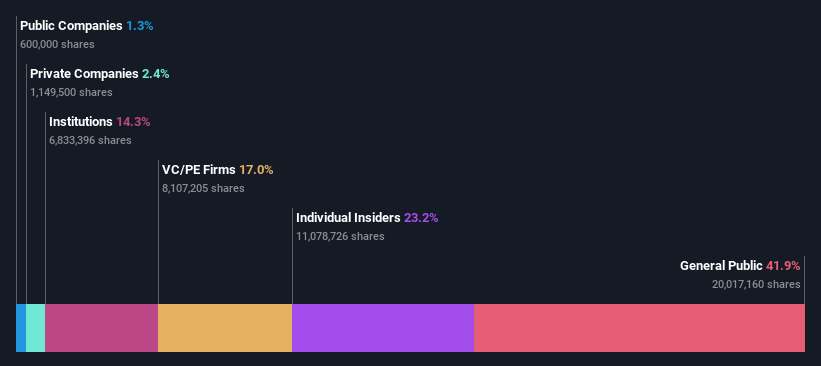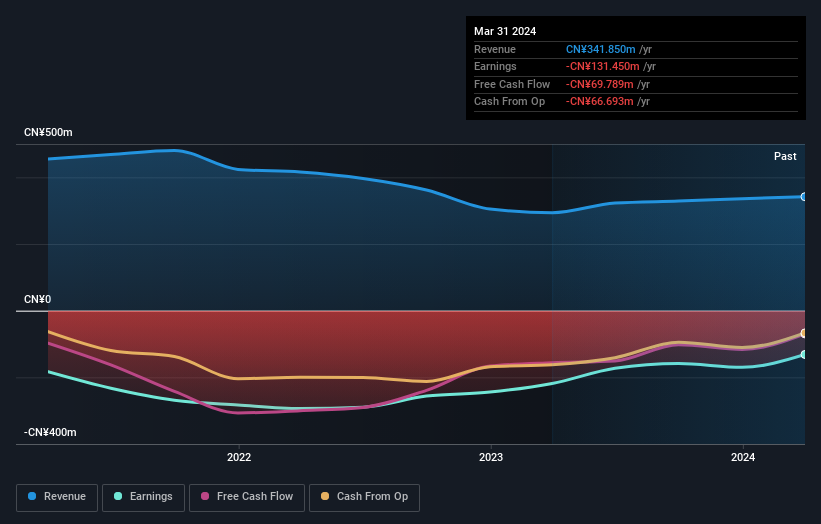Stock Analysis
QingCloud Technologies Corp.'s (SHSE:688316) stock price dropped 11% last week; individual investors would not be happy

Key Insights
- The considerable ownership by individual investors in QingCloud Technologies indicates that they collectively have a greater say in management and business strategy
- The top 11 shareholders own 52% of the company
- Insiders own 23% of QingCloud Technologies
A look at the shareholders of QingCloud Technologies Corp. (SHSE:688316) can tell us which group is most powerful. And the group that holds the biggest piece of the pie are individual investors with 42% ownership. Put another way, the group faces the maximum upside potential (or downside risk).
While insiders who own 23% came under pressure after market cap dropped to CN¥1.4b last week,individual investors took the most losses.
Let's take a closer look to see what the different types of shareholders can tell us about QingCloud Technologies.
See our latest analysis for QingCloud Technologies

What Does The Institutional Ownership Tell Us About QingCloud Technologies?
Many institutions measure their performance against an index that approximates the local market. So they usually pay more attention to companies that are included in major indices.
QingCloud Technologies already has institutions on the share registry. Indeed, they own a respectable stake in the company. This suggests some credibility amongst professional investors. But we can't rely on that fact alone since institutions make bad investments sometimes, just like everyone does. If multiple institutions change their view on a stock at the same time, you could see the share price drop fast. It's therefore worth looking at QingCloud Technologies' earnings history below. Of course, the future is what really matters.

QingCloud Technologies is not owned by hedge funds. Looking at our data, we can see that the largest shareholder is the CEO Yunsong Huang with 14% of shares outstanding. Meanwhile, the second and third largest shareholders, hold 10% and 6.5%, of the shares outstanding, respectively.
A closer look at our ownership figures suggests that the top 11 shareholders have a combined ownership of 52% implying that no single shareholder has a majority.
While studying institutional ownership for a company can add value to your research, it is also a good practice to research analyst recommendations to get a deeper understand of a stock's expected performance. We're not picking up on any analyst coverage of the stock at the moment, so the company is unlikely to be widely held.
Insider Ownership Of QingCloud Technologies
The definition of an insider can differ slightly between different countries, but members of the board of directors always count. Company management run the business, but the CEO will answer to the board, even if he or she is a member of it.
I generally consider insider ownership to be a good thing. However, on some occasions it makes it more difficult for other shareholders to hold the board accountable for decisions.
Our information suggests that insiders maintain a significant holding in QingCloud Technologies Corp.. It has a market capitalization of just CN¥1.4b, and insiders have CN¥321m worth of shares in their own names. It is great to see insiders so invested in the business. It might be worth checking if those insiders have been buying recently.
General Public Ownership
With a 42% ownership, the general public, mostly comprising of individual investors, have some degree of sway over QingCloud Technologies. While this size of ownership may not be enough to sway a policy decision in their favour, they can still make a collective impact on company policies.
Private Equity Ownership
With an ownership of 17%, private equity firms are in a position to play a role in shaping corporate strategy with a focus on value creation. Some investors might be encouraged by this, since private equity are sometimes able to encourage strategies that help the market see the value in the company. Alternatively, those holders might be exiting the investment after taking it public.
Next Steps:
While it is well worth considering the different groups that own a company, there are other factors that are even more important. Be aware that QingCloud Technologies is showing 1 warning sign in our investment analysis , you should know about...
Of course, you might find a fantastic investment by looking elsewhere. So take a peek at this free list of interesting companies.
NB: Figures in this article are calculated using data from the last twelve months, which refer to the 12-month period ending on the last date of the month the financial statement is dated. This may not be consistent with full year annual report figures.
Valuation is complex, but we're helping make it simple.
Find out whether QingCloud Technologies is potentially over or undervalued by checking out our comprehensive analysis, which includes fair value estimates, risks and warnings, dividends, insider transactions and financial health.
View the Free AnalysisHave feedback on this article? Concerned about the content? Get in touch with us directly. Alternatively, email editorial-team (at) simplywallst.com.
This article by Simply Wall St is general in nature. We provide commentary based on historical data and analyst forecasts only using an unbiased methodology and our articles are not intended to be financial advice. It does not constitute a recommendation to buy or sell any stock, and does not take account of your objectives, or your financial situation. We aim to bring you long-term focused analysis driven by fundamental data. Note that our analysis may not factor in the latest price-sensitive company announcements or qualitative material. Simply Wall St has no position in any stocks mentioned.
Valuation is complex, but we're helping make it simple.
Find out whether QingCloud Technologies is potentially over or undervalued by checking out our comprehensive analysis, which includes fair value estimates, risks and warnings, dividends, insider transactions and financial health.
View the Free AnalysisHave feedback on this article? Concerned about the content? Get in touch with us directly. Alternatively, email editorial-team@simplywallst.com
About SHSE:688316
QingCloud Technologies
Provides cloud services and digital solutions in China.
Flawless balance sheet and overvalued.

